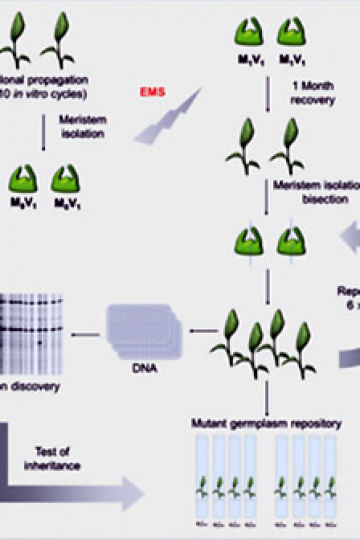Figure 1 A strategy for meristematic mutagenesis, chimera dissolution and mutation recovery in vegetatively propagated banana. Clonally propagated isogenic plants are prepared through 10 rounds of in vitro multiplication. Shoot apical meristems are isolated and soaked in EMS, then allowed to recover for 1 month. Individuals from the first vegetative generation (M1V1) are propagated through meristem isolation and longitudinal bisection to produce the M1V2 generation. Successive rounds of isolation and division are performed to reduce genotypic heterogeneity, and the number of individuals approximately doubles each generation. Tissue is collected from M1V6 individuals, and DNA is extracted and screened for induced mutations. The inheritance of isolated mutations is evaluated in the M1V6 and subsequent generations, allowing for estimations of the rate of chimera dissolution.

If you would like to learn more about the IAEA’s work, sign up for our weekly updates containing our most important news, multimedia and more.
Induction, Rapid Fixation and Retention of Mutations in Vegetatively Propagated Banana
Joanna Jankowicz-Cieslak, Owen A. Huynh, Marta Brozynska, Joy Nakitandwe† and Bradley J. Till* Plant Breeding and Genetics Laboratory, Joint FAO/IAEA Centre of Nuclear Techniques in Food and Agriculture, IAEA Laboratories Seibersdorf, International Atomic Energy Agency, Vienna International Centre, Vienna, Austria Plant Biotechnology Journal (2012) 10, pp. 1056–1066 doi: 10.1111/j.1467-7652.2012.00733.x
Summary
Mutation discovery technologies have enabled the development of reverse genetics for many plant species and allowed sophisticated evaluation of the consequences of mutagenesis. Such methods are relatively straightforward for seed-propagated plants. To develop a platform suitable for vegetatively propagated species, we treated isolated banana shoot apical meristems with the chemical mutagen ethyl methanesulphonate, recovered plantlets and screened for induced mutations. A high density of GC-AT transition mutations were recovered, similar to that reported in seed-propagated polyploids. Through analysis of the inheritance of mutations, we observed that genotypically heterogeneous stem cells resulting from mutagenic treatment are rapidly sorted to fix a single genotype in the meristem. Further, mutant genotypes are stably inherited in subsequent generations. Evaluation of natural nucleotide variation showed the accumulation of potentially deleterious heterozygous alleles, suggesting that mutation induction may uncover recessive traits. This work therefore provides genotypic insights into the fate of totipotent cells after mutagenesis and suggests rapid approaches for mutation-based functional genomics and improvement of vegetatively propagated crops.
In order to download the full paper and to have access to all supplementary material, please use this link to the WILEY online library: http://onlinelibrary.wiley.com/doi/10.1111/j.1467-7652.2012.00733.x/abstract



